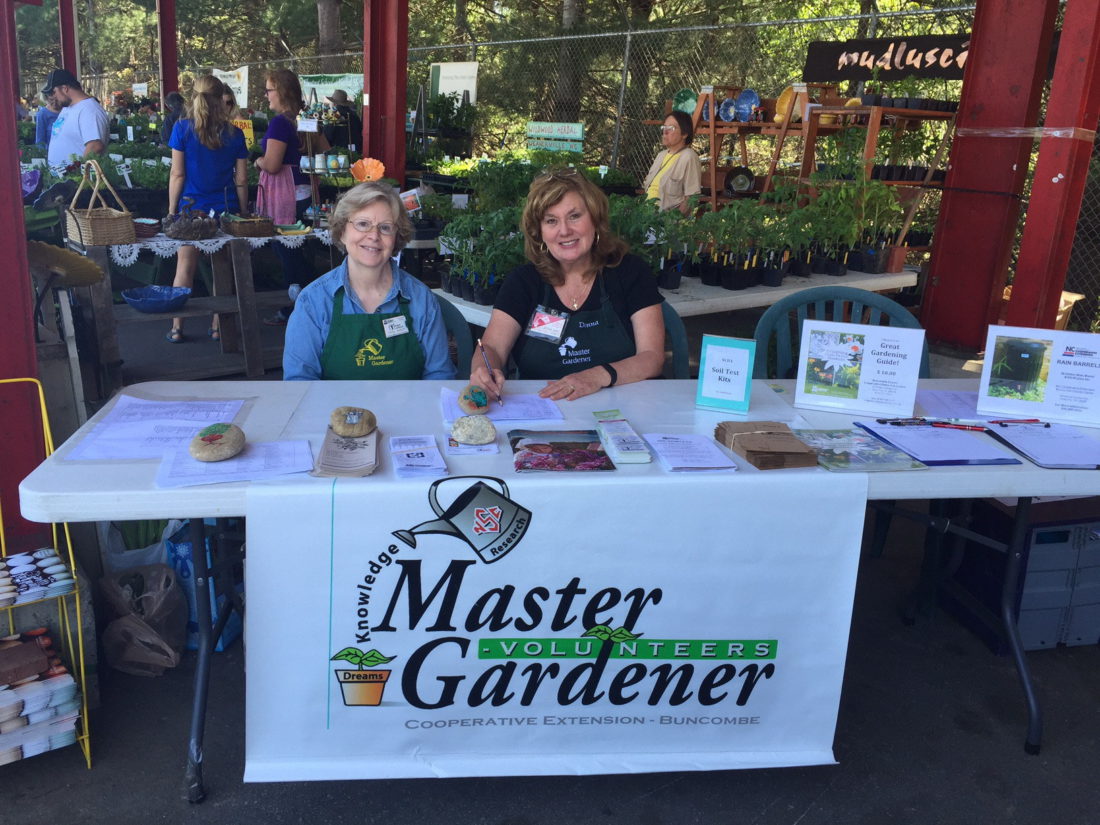Tomato blight getting you down? Pesky black spots on your roses? Don’t give up hope on your green thumb just yet. The Buncombe County Extension Master Gardeners might be able to squash your troubles.
“We like to say we’re growing gardeners,” says Pat Strang, who has been an area master gardener since 2015 and chairs the Garden Helpline and its sister service, the Info Tables. “Our mission is to educate the people in Buncombe County on sustainable gardening practices. Everything we do is research-based. We don’t just make things up or do them our own way.”
During the March to September growing season, about 35 master gardeners tend the helpline, a free phone service available to anyone in the county. Volunteers are available only two days a week, but callers can always leave a voice message or send an email, and a volunteer or Extension Agent Alison Arnold will typically respond with a well-researched answer within the week. The research database and library, located on Mount Carmel Road, is largely sourced from N.C. State University.
Working in tandem with the goals of the helpline, Master Gardener Info Tables program volunteers make frequent appearances at the Asheville City, North Asheville and Black Mountain farmers markets and set up at special events such as plant sales and garden shows. Neither the helpline nor the information booths are new, but Strang says the Info Tables program has undergone some key changes under her leadership in the past three years.
“In the past, the Info Tables were more of a place where we passed out pamphlets. Now we have hands-on displays and welcome people bringing in live samples and photographs for identification,” Strang says. “We also publish our schedule online so people can find us more easily.”
Nancy Good, another master gardener, says that she often brings a shoebox of worms to the table, which she uses in her permaculture practice. “Kids are fascinated by them, and it’s such a good way to enrich your soil, just throwing them in your garden,” she says.
Other volunteers have created displays on plant cuttings, rooting compounds and techniques for sharpening and repairing rusty tools. The booths also offer free soil test kits, which are analyzed at N.C. State’s test lab, so gardeners can figure out what amendments they might need to optimize their soil chemistry.
“We have all these microclimates, and you really have to take that into consideration,” says Strang. “One of the first questions we ask is what’s your elevation and what’s your soil like? There’s a lot of places that are rocky or have clay that people aren’t used to.”
To achieve master gardener status, volunteers must first make it through a waiting list of about 70 prospects. Of those, 20 will undergo rigorous training that includes 35 hours of classes on soil, diseases and pests along with at least 40 volunteer hours. Arnold usually leads classes for the program, which is funded by the N.C. Cooperative Extension.
“Most of us come from a different occupation than gardening — we’re doctors, stay-at-home parents, bankers,” says Good. “We all really like gardening and enjoy helping other people out.”
For the Garden Helpline, call 828-255-5522 Mondays and Thursdays, 10 a.m.-2 p.m. Find the Info Tables schedule and details about the Master Gardeners program at buncombemastergardener.org.




Before you comment
The comments section is here to provide a platform for civil dialogue on the issues we face together as a local community. Xpress is committed to offering this platform for all voices, but when the tone of the discussion gets nasty or strays off topic, we believe many people choose not to participate. Xpress editors are determined to moderate comments to ensure a constructive interchange is maintained. All comments judged not to be in keeping with the spirit of civil discourse will be removed and repeat violators will be banned. See here for our terms of service. Thank you for being part of this effort to promote respectful discussion.